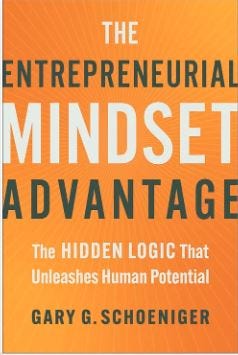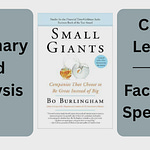Briefing Document: The Entrepreneurial Mindset Advantage by Gary G. Schoeniger
This briefing document summarizes the key themes, ideas, and important facts presented in the provided excerpts from Gary G. Schoeniger's book, "The Entrepreneurial Mindset Advantage." The core argument revolves around redefining entrepreneurship as a universal mindset and a process for creating value for others, accessible to anyone regardless of background or traditional business aspirations.
Core Argument:
Schoeniger fundamentally challenges the traditional, narrow definition of entrepreneurship, which often focuses on starting businesses, seeking venture capital, or possessing inherent personality traits like risk-taking. He argues that "The Entrepreneurial Mindset Advantage" is not about being born with specific traits, but about adopting a powerful cognitive framework and behavioral approach centered on the self-directed pursuit of opportunities to create value for others. This mindset, he asserts, is the "hidden mechanism that guides our behavior" and is crucial for thriving in an increasingly complex and changing world.
Main Themes and Key Ideas:
Redefining Entrepreneurship Beyond Business Creation:
The traditional view of entrepreneurship is limited, focusing on organizing and managing a business, a concept that emerged during the Industrial Revolution to distinguish between employers and employees.
Schoeniger proposes a broader definition: "Entrepreneurship is the self-directed pursuit of opportunities to create value for others." This perspective allows anyone, in any situation (employee, student, community member), to be entrepreneurial.
Quotes emphasizing this redefinition:
"In The Entrepreneurial Mindset Advantage, Gary Schoeniger demystifies the concept of the entrepreneurial mindset, expanding it beyond business to encompass life and daily decision-making." - Dawn Halfaker
"From this perspective, we can now redefine entrepreneurship as the self-directed pursuit of opportunities to create value for others. When viewed from this perspective, we no longer see entrepreneurs as distinguished by their traits but as entrepreneurial people who simply take it upon themselves to figure out how to make themselves useful to others, in whatever situation they find themselves..."
Mindset as a Powerful, Often Unconscious, Mechanism:
Mindset is presented as a "hypothetical construct" representing underlying values, assumptions, and habitual thought patterns that influence behavior, perception, and decision-making, often without conscious awareness.
It acts as a "hidden mechanism that optimizes our ability to self-actualize" by guiding behavior towards learning, growth, and leveraging circumstances.
Conversely, a limiting mindset can "hijack our emotions," "blind us to opportunities," and keep us "tethered to familiar yet unproductive patterns."
Mindset is not the same as intelligence or personality traits; it is a pattern of "basic assumptions learned by an individual that has worked well enough to be considered valid."
Much of our mindset is "unconsciously acquired" through socialization and subjective interpretation of experiences, making it difficult to recognize and change.
Quote highlighting the power of mindset: "Until you make the unconscious conscious, it will direct your life and you will call it fate." - Carl Jung (epigraph)
Quote using an analogy to illustrate mindset's impact: "Drawing from an analogy Warren Buffett once used, a person might have a 400-horsepower engine, yet their mindset is such that they may only be able to get 100 horsepower of output, whereas another person may have a 200-horsepower engine, yet their mindset is such that they are able to get all 200 horsepower of output."
Challenging Myths About Entrepreneurs:
Myth 1: Entrepreneurs are born with specific traits. The excerpts strongly refute the idea that entrepreneurs are a "rare breed" with innate qualities like risk-taking. Studies trying to identify personality traits of entrepreneurs have been inconclusive. Willingness to tolerate risk is influenced by confidence and the perceived value of the outcome, not just personality.
Quote from Peter Drucker: "The successful ones [entrepreneurs] I know all have, however, one thing—and only one thing—in common: they are not ‘risk takers.’ They try to define the risks they have to take and to minimize them as much as possible."
Myth 2: Entrepreneurship is about jumping off a cliff and building a parachute on the way down. Schoeniger argues that this "daring narrative" is impractical for typical entrepreneurs and likely to lead to disaster.
Myth 3: Successful startups require meticulously crafted business plans and external funding. This is presented as a "myth" that reflects a managerial, rather than entrepreneurial, mindset. The opportunity discovery process is inherently ambiguous and unpredictable, making extensive upfront planning counterproductive.
Myth 4: It takes money to make money. Access to significant resources can actually hinder the opportunity discovery process by encouraging a "build-it-and-they-will-come mentality." Resource constraints, ironically, force everyday entrepreneurs to be experimental and learn by doing, which minimizes risk.
Quote: "The idea that it takes money to make money is among the most persistent myths of entrepreneurship."
Quote: "Here again, the lack of resources works to the advantage of everyday entrepreneurs, forcing them to test their ideas on a small scale and learn from the results. It also prevents them from taking big risks. Therefore, even if you do have access to resources, you should act as if you don’t."
The Entrepreneurial Process: Exploration, Experimentation, and Replication:
Everyday entrepreneurs operate through a behavioral phenomenon rather than a business discipline, employing a "go-in-order-to-know" strategy (effectual reasoning) in contrast to the "know-before-you-go" approach of managerial systems.
The opportunity discovery process is presented as analogous to the scientific method and occurs in three phases:
Exploration: Identifying potential problems or unmet needs through observation and inquiry, driven by empathy. Empathy and emotional intelligence are highlighted as "secret weapons."
Experimentation: Formulating hypotheses (guesses based on limited evidence) and conducting small-scale tests (minimally viable products or services - MVP/S) to gather evidence of usefulness. Learning from failures ("micro-failures") is crucial.
Replication: Once an idea is validated by paying customers, replicating and refining it to determine sustainability (enough customers, entrepreneur's commitment, capability). This phase nears the "first break point" where managerial thinking becomes more relevant.
Quote summarizing the process: "Rather than taking big risks or engaging in careful planning and in-depth market research, these everyday entrepreneurs learn by doing through a process of experimentation and adaptation. In other words, they embrace a go-in-order-to-know strategy that enables them to tease out latent opportunities with minimal risk."
The Entrepreneurial Mindset Challenge:
This is a practical exercise designed to cultivate entrepreneurial attitudes and skills.
It involves starting with a small, affordable amount of money (e.g., $5 or $50) and aiming to multiply it by a factor of ten by "making yourself useful to others."
The purpose is not primarily profit but to create "resource-constrained circumstances" that necessitate entrepreneurial thinking and provide "evidence—not only of the usefulness of your ideas but of your capabilities as an entrepreneur."
Unlocking Entrepreneurial Potential in Others:
The entrepreneurial mindset and its associated processes can be taught and applied in various contexts beyond traditional business, including within existing jobs and in educational settings.
Redefining entrepreneurship and emphasizing its behavioral aspects is key to engaging reluctant learners.
Effective methods for cultivating this mindset include fostering curiosity, challenging assumptions (using techniques like Socratic questioning), and encouraging practical application through projects and challenges.
Examples are provided of individuals (like Rob Vigil, a sanitation supervisor) and programs (like those in South Africa and at Independence Community College) that have successfully unlocked entrepreneurial potential in non-traditional settings.
The Human Spirit and Self-Actualization:
The entrepreneurial mindset is linked to fundamental human drives like self-actualization and the pursuit of purpose.
Creating value for others is presented as a powerful source of motivation and a means of unleashing human potential.
Quote: "The essence of an entrepreneurial mindset is an underlying assumption that it is our individual responsibility to figure out how to make ourselves useful to others, in whatever circumstances we may find ourselves, and that by doing so, we can empower ourselves."
Quote: "The need for purpose [is] the need for an overarching, self-organizing, future-oriented aspiration that energizes one’s efforts and provides a central source of meaning and significance in one’s life." - Scott Barry Kaufman
Most Important Ideas/Facts:
Entrepreneurship is redefined as the self-directed pursuit of opportunities to create value for others. This is a core principle that expands the concept beyond traditional business startups.
Mindset is a powerful, largely unconscious mechanism that significantly influences our ability to perceive opportunities, make decisions, and achieve our potential. Understanding and consciously shaping our mindset is crucial.
Traditional myths about entrepreneurs, particularly regarding inherent traits and the necessity of upfront planning and funding, are debunked. Everyday entrepreneurs thrive through experimentation and adaptation in resource-constrained environments.
The entrepreneurial process is characterized by exploration, experimentation, and replication, driven by empathy and a "go-in-order-to-know" strategy. This iterative, evidence-based approach minimizes risk and allows for the discovery of latent opportunities.
The Entrepreneurial Mindset Challenge provides a practical framework for developing entrepreneurial attitudes and skills through small-scale, purposeful projects.
The entrepreneurial mindset can be cultivated and applied in diverse settings, unlocking potential in individuals and communities beyond traditional business contexts.
The entrepreneurial spirit is fundamentally linked to the human spirit's drive for self-actualization and finding purpose by creating value for others.
In conclusion, "The Entrepreneurial Mindset Advantage" presents a compelling case for embracing an entrepreneurial mindset not as a path solely for business founders, but as a vital approach for personal and professional growth in a rapidly changing world. By understanding and applying the principles of opportunity discovery and value creation, individuals can empower themselves and contribute meaningfully to their communities.
Study Guide: The Entrepreneurial Mindset Advantage
Quiz
Answer each question in 2-3 sentences.
According to Wendy Guillies's foreword, what unique quality does Gary Schoeniger possess that allowed him to write this book?
How does John R. Dearie describe the relationship between mindset and the entrepreneurial journey?
Beyond traditional business, how does Dawn Halfaker view the application of the entrepreneurial mindset?
Based on the excerpt, what is the primary focus of Schoeniger's previous book, "Who Owns the Ice House?"
According to Adam Smith, what is a natural human tendency that relates to the concept of entrepreneurship?
How does the book redefine entrepreneurship beyond the narrow focus of starting a business?
Why is the traditional approach of writing a detailed business plan and seeking outside funding considered premature for a typical entrepreneur?
What is the significance of Elias Ruiz's initial makeshift prototype using plywood and plastic bottles?
What is the fundamental principle behind the Entrepreneurial Mindset Challenge?
According to the text, why is self-direction a powerful motivational force, especially in the context of entrepreneurial pursuits?
Quiz Answer Key
Guillies states that Schoeniger's unique perspective, experience, and unwavering dedication to the entrepreneurial mindset allowed him to distill a lifetime of learning into a transformative message.
Dearie emphasizes that the entrepreneurial journey is fundamentally defined by one's mindset, and Schoeniger's book provides insights and strategies to empower individuals to turn ideas into action and challenges into opportunities.
Halfaker sees the entrepreneurial mindset as a universal asset that extends beyond business into life and daily decision-making, driving change and fueling optimism.
The source material primarily identifies "Who Owns the Ice House?" as another book authored by Gary G. Schoeniger that deals with "Eight Life Lessons from an Unlikely Entrepreneur."
Adam Smith observed that humans naturally "live by exchanging," highlighting the inherent tendency for trade and exchange as a fundamental aspect of human nature.
The book redefines entrepreneurship as the self-directed pursuit of opportunities to create value for others, regardless of whether one is starting a business or is in a traditional role.
Business planning is considered premature because it assumes a level of certainty and capability that the typical, inexperienced entrepreneur in the discovery phase does not yet possess.
The makeshift prototype demonstrates the "go-in-order-to-know" strategy and the use of minimal resources to quickly test an idea and gather feedback through experimentation.
The fundamental principle is to take a small amount of money and transform it into a significantly larger amount by making oneself useful to others, thereby developing entrepreneurial attitudes and skills through practical experience.
Self-direction is powerful because it allows individuals to pursue problems to solve and fulfill human needs through their own efforts, which is a deeply motivating force.
Essay Format Questions
Discuss the distinction between the "managerial mindset" and the "entrepreneurial mindset" as presented in the source material. How do these mindsets influence an individual's approach to problem-solving, opportunity recognition, and navigating uncertainty? Provide examples from the text to support your points.
Analyze the author's argument that entrepreneurship is not solely determined by innate personality traits. How does the text explain the role of cognitive belief structures, motivational factors, and situational variables in fostering entrepreneurial behavior?
Explain the "opportunity discovery process" as described in the source material, including its distinct phases (exploration, experimentation, and replication). How does this process challenge conventional notions of starting a business, such as extensive business planning and seeking outside funding?
Evaluate the importance of empathy and emotional intelligence in the entrepreneurial mindset, as discussed in the text. How do these qualities enable entrepreneurs to identify and address the unarticulated needs of others, and how does this contribute to the success of their ventures?
Examine the concept of "self-actualization" and its connection to entrepreneurial behavior. How does engaging in purposeful, self-directed work, as exemplified by entrepreneurs, contribute to an individual's growth and fulfillment, and how can this potential be unlocked in various settings?
Glossary of Key Terms
Apex fallacy: The tendency to evaluate a group based solely on its top performers rather than a representative sample.
Break points: Moments in time within a living system's transformation when the rules for survival change as the system shifts between phases.
Cognitive belief structures (a.k.a. mindset): The framework of beliefs that individuals form through their experiences, affecting their sense of agency and ability to pursue goals.
Discovery phase: The initial phase in Land's theory of transformation where a system searches for a connection with its environment.
Effectual reasoning: A "go-in-order-to-know" strategy embraced by everyday entrepreneurs, characterized by experimentation and adaptation to tease out latent opportunities with minimal risk.
Empathy: The ability to understand the needs of others from their perspective, including both functional and deeper social/emotional dimensions.
Entrepreneurial mindset: An underlying assumption that it is an individual's responsibility to figure out how to make themselves useful to others, leading to self-empowerment. It is a way of thinking and acting distinct from a managerial mindset.
Experimentation phase: The phase in the opportunity discovery process where entrepreneurs test their ideas through small-scale experiments and learn from the results.
Exploration phase: The initial phase in the opportunity discovery process focused on identifying potential problems or unmet needs, often through observation and inquiry.
Fundamental attribution error: The tendency to overemphasize dispositional traits while underemphasizing situational factors when explaining behavior.
Go-in-order-to-know strategy: An experimental approach where action and learning precede extensive planning, characteristic of effectual reasoning.
Growth phase: The second phase in Land's theory of transformation where a system replicates the connection found in the discovery phase in order to grow.
Hypothesis: A guess based on limited evidence, serving as a starting point for investigation and experimentation in the opportunity discovery process.
Managerial mindset: A way of thinking often associated with established organizations, emphasizing careful planning, analytical skills, and replicating known processes rather than discovering new opportunities.
Micro-experimentation: Testing ideas on a small scale to gather feedback and learn, a core method in the opportunity discovery process.
Minimally viable product or service (MVP/S): A basic version of an offering used to test an idea with potential customers and gather initial evidence of usefulness.
Obsolescence: The third phase in Land's theory of transformation where growth slows, and a system must reinvent itself or become obsolete.
Opportunity discovery process: An iterative, experimental, evidence-based process for identifying, evaluating, and actualizing opportunities, characterized by exploration, experimentation, and replication.
Replication phase: The final phase in the opportunity discovery process where a validated idea is refined and replicated in a sustainable way.
Self-actualization: The innate motivation of an organism to realize its full potential, described as a "master motive" and a tendency to actualize oneself.
Self-direction: Taking personal responsibility for learning, growth, and pursuing goals, a key component of the entrepreneurial mindset.
Sense of agency: An individual's belief in their own ability to act and pursue desired goals, influenced by their cognitive belief structures (mindset).
Taken-for-granted assumptions: Deeply ingrained mental habits and beliefs acquired consciously or unconsciously that influence behavior in ways individuals may not be aware of.
Useful thing: Refers to the value that individuals create and exchange with others, a core concept in the redefinition of entrepreneurship.
Zone of proximal development: The space between what a learner can do independently and what they can achieve with support, relevant to facilitating entrepreneurial learning.
convert_to_textConvert to source
NotebookLM can be inaccurate; please double check its responses.
















Share this post